The physical object, which he calls the 'thing in itself',(1) he regards as essentially unknowable; what can be known is the object as we have it in experience, which he calls the 'phenomenon'. The phenomenon, being a joint product of us and the thing in itself, is sure to have those characteristics which are due to us, and is therefore sure to conform to our a priori knowledge. Hence this knowledge, though true of all actual and possible experience, must not be supposed to apply outside experience. Thus in spite of the existence of a priori knowledge, we cannot know anything about the thing
...more
Welcome back. Just a moment while we sign you in to your Goodreads account.


